We interviewed Stephen [Egerton, Tape Op #12] in 1999, which certainly touched on The Blasting Room. Your studio began before Tape Op.
Yeah. We started in '94.
I'd always hear through the grapevine what was up with the studio's co-owner, Bill Stevenson [All, Descendents, Black Flag]. How did you become a part of it?
I was living in Seattle, [Washington], and playing in a band. The guy who was managing the band that I was in was also managing All. He got those guys a deal on Interscope [Records]. Stephen and Bill had done a lot of their own records, as well as other groups. They did that instead of going to the studio and spending… I don't know how much money they used to get back in the '90s. A lot!
On a major label.
Yeah. So, they were like, "We're going to open our own studio." They were living in Missouri at the time, because they were on tour nine months out of the year, and it was cheap to live out there. That's why they moved there from L.A. But they decided it was too small, and picked Fort Collins, [Colorado], to move to. Our band's manager said, "Hey, I'm moving out to Fort Collins. You want to come with me?" I was selling beer for Miller brands up in Seattle at the time.
Were you a beer rep?
A beer salesman, yeah. I had met Bill and Stephen a handful of times beforehand. They had come up and recorded [the Seattle band] Zeke, and they stayed at my house because of our manager connection. I was 23, playing in my band, and I thought, "I don't think I can do this job for the rest of my life! I'm going to go out there and try it." I moved out here and became the first intern. I had been in a studio a few times, in Tacoma, [Washington], and that lit a fire under my ass. I had bought a 4-track, recorded my band in the basement, and then got an 8-track reel-to-reel from Rob Skinner from the band Coffin Break. When I moved out there, we had an Otari MTR-90, which we still have, a Mackie [console], plus Focusrite ISA 215 and 4-channel Red 1 mic preamps. Super limited! I just soaked it up. I lived on the couch for a month before I found a place to live. I started going on tours with those guys, doing monitors and drum tech'ing.
What was the growth of the studio like?
A very slow but natural trajectory. When it started, it wasn't supposed to really be a commercial studio at all. It was supposed to be for the band to make their albums and practice. As soon as it got built, lots of bands called up, "You have a studio now? Cool!" So, we started recording. For the first three or four years, Descendents would go on tour, I would go with them, and the studio was shut down while we were on tour. When we started getting busy, Bill said, "You should stay home and work at the studio." I became the house guy around 2002. Then All and Descendents took a break, and Bill and I became studio rats. One time I worked 90 days in a row for 12 hours a day. No breaks. Our calendar used to be 12 bands a year. Each band would come in for 20 to 25 days, back-to-back, for five years. It was nutso in the mid-2000s.
Oh, my god!
We slowed down a little bit, 2010-ish, when streaming took over, budgets went away, and people started doing singles and EPs instead of albums. Our business changed from back-to-back months of bands to "one guy's going to come in for two days." We originally only had one room when we started, and then the band I was playing in built a practice room with pay from our record in '97. Then we turned that into our Studio B. All this shit is super DIY. The more we get on, each person we hire is smarter than the last. The newest guy, Jonathan Luginbill, built us two brand new studios, including the one I'm in. He's redone the whole studio! We've torn down walls, torn down the ceiling, and the floor. We make improvements gradually and get bigger. Currently we have four rooms and a fifth "editing closet."

It's handy to have a space like that.
Yeah. We even have Pro Tools computers in the office if somebody needs that. Bill and I own the place.
You bought in along the way?
Yeah, in 2012 or '13. Bill's not really into gear at all. We bought the SSL [console] because Andy Wallace [Tape Op #25] mixed the Descendents' Everything Sucks. He only mixes on an SSL, and he has no outboard gear except for a couple delays and reverbs. Bill was stoked on that. "We don't need any gear. Let's just get an SSL." We had minimal outboard gear. I got bored of that, and I would spend $30,000 of my personal money every year to fill up our racks. After a while I owned way more gear than the studio did.
Has it always been in the same building?
Always. We finally bought the building two years ago. We rent out the other half to a church, and then we have a warehouse in the back that we rent out to a PA company. We tried to move a couple of times. This building was built in 1940. It's not a dump, but it's old. We'd think, "We should get a better building," but our rent was super low! That's why we've survived for so long, because we never had to sell our souls to do shit we didn't want to do just to pay the bills.
It's such a unique studio as it's based around the careers of Descendents and All.
Yeah. When we started, it was a lot of Descendents fans who would sound like them. I don't think we've ever advertised. It's always been word of mouth. We probably recorded 75 percent of the bands that played on the Warped Tour. Nowadays, we've got younger kids, and music has changed. We have more diversified records now. Chris Beeble does most of the modern music now.
I imagine that you're not getting acoustic singer-songwriters?
Not all the time, but another guy who has worked here since 2000, Andrew Berlin, did the last two Gregory Alan Isakov records. The last one [Evening Machines] got Grammy-nominated for Best Folk Album. That's a legit singer-songwriter.
Have you shifted more into mixing?
Yeah. I've always enjoyed mixing more than recording. For the last four or five years I haven't recorded more than two or three albums a year. I'm mostly doing mixing and a lot of mastering, which I started doing in '98. When we first opened, we would send our tracks out to get mastered. Half the time we'd be like, "This sucks!" We didn't know what we were doing. We're so DIY, we thought, "If anyone's going to screw up our work, let's be the ones to screw it up." Not knowing that we should use somebody else who's better than us! I got a TC Electronic Finalizer and a [Waves] L2 [limiter] in '98. I've grown tremendously since then, but I've been mastering forever. I do a lot of mastering instead of recording.
Initially it was out of necessity, but then you became known for mastering?
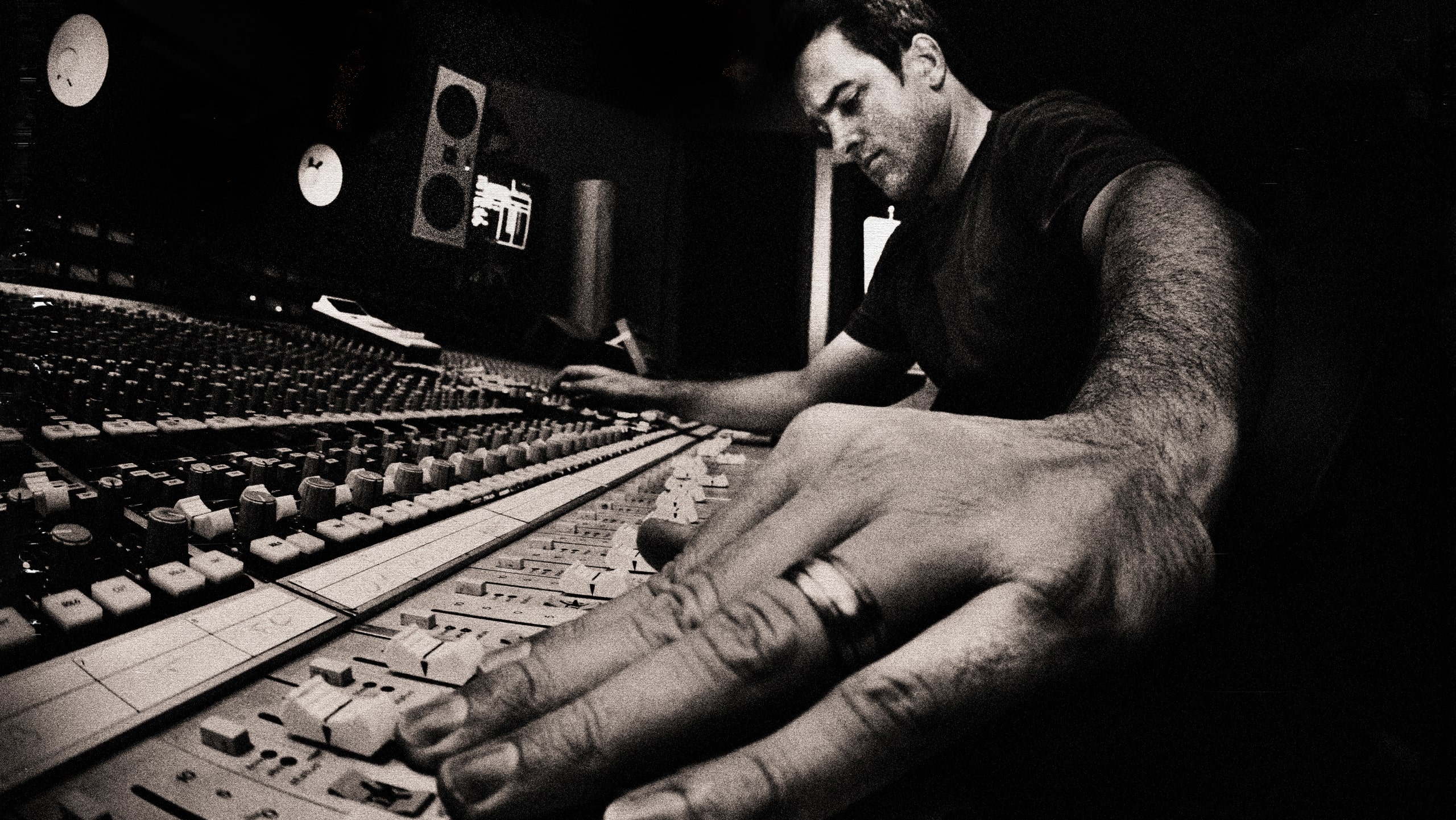
Yeah. It was definitely out of necessity. People say, "Oh, he did our last record! Send it to him." I don't think I ever sucked. I always had an aversion to records that were too loud where I could hear distortion.
You'll start to hear the clipping as distortion if you're trying to make a track louder and louder.
I can't turn the volume down low enough to listen to it! But the limiters now are so much better that I can get it that loud if desired, without completely ruining it like before. When all I had was an L2 I could only get the record as loud as where I wanted the snare drum to be, because the snare would disappear if I took it too loud. Now I can mix into limiters and accommodate for all that.
Are people relaxing on the "make it louder" request?
Oh, yeah. Eight years ago, half the people would say, "Can you make it louder?" Now one in 20 ask me to turn it up, and maybe three in 20 ask me to turn it down! Some people are smarter now, or there's more knowledge. People have relaxed on the loudness quest.
I get that when I'm mixing. People will want it to be louder than how I'm mixing it. I'll say, "It'll get mastered!"
Right. I used to always deliver my mixes a little bit louder than the mix was actually at to people and say, "Look, this is the mix. It's not the master." Now that I'm older I've succumbed to it a little bit. When I'm getting close, I'll put a limiter on there to a "quasi-mastered" volume and think, "Okay, what's going to change?" I give people something that's not quite as loud as a master, but definitely way louder than I used to.
It's interesting that when you're on the quest to make mixes feel loud, aggressive, and big, you've got to keep reining it in a little bit in order to do it well.
The story of my life is reining it in. Every half an hour, "Aw, shit. It's flat now! Pull it down. I want to feel the kick drum, dammit."
Have you learned a lot about your own mixing from mastering other peoples' work?
I always have my same instincts while I'm mixing. The meat and potatoes of them haven't changed. It's still there, it's just that now I know how to adorn the mix better and get something sheenier or punchier. But I still have the same aesthetic, for the most part. I do agree with you, I'm always trying to figure out what not to do. I get all kinds of mixes, but, for the most part, I don't get too many bad ones. Occasionally, I'll have to call someone and ask, "Can you take whatever you had on the mix bus off? I can't do anything with this." They're like, "Oh, cool. This is the first time we've ever done this."
Are you still doing all your mixing on the SSL?
I stopped mixing on the SSL two or three years ago. We'd been renting the building we were in since 1994. The lady who owned it owned a furniture store here. She took off, so we took over the whole building. We expanded and built the room that I'm in right now – the mastering room – and then another studio. We had a guy named John Brandt [John H. Brandt Acoustic Designs] design this one for us. We built it ourselves, but he had legit plans as opposed to the rest of the studio. It turned out really well. After I'd been working in the mastering room here for a bit, I realized, "I don't know if I can go back into the A room." It sounds so much better to me in here, right in the sweet spot. Is it worth it to mix on the console? You know how people are now. They don't even get back after you mix it for who knows how long. When I was at the console, I used to be like, "Look dudes. We're mixing now. You have to be around. I'm going to send you a mix. You've got to get back to me."
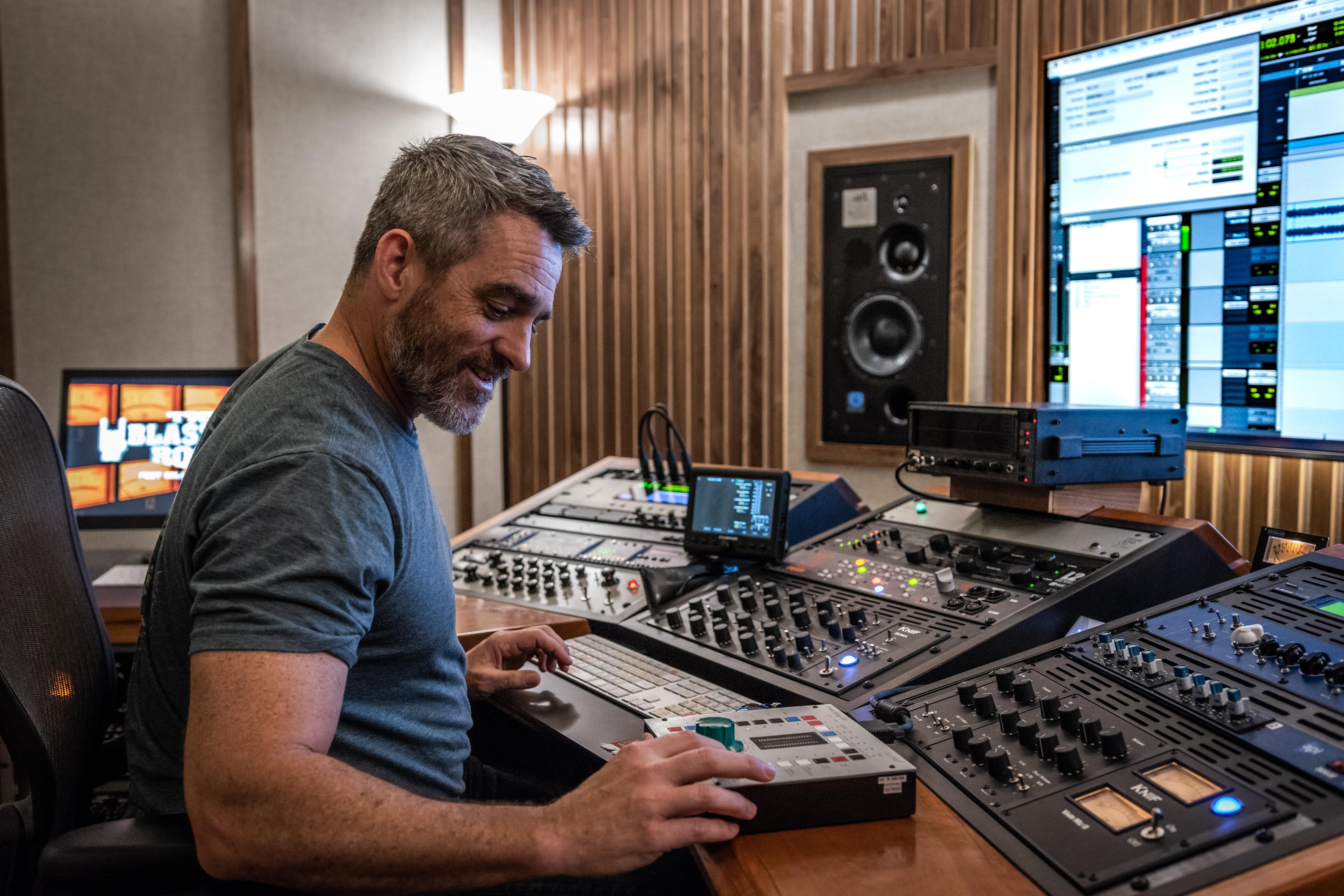
Same here.
For the most part, people would do that. Now, hardly anybody mixes on a console. It feels like people don't give a shit, and they don't get back to me a lot of times. I was like, "I can't do that anymore." I could, but console recalls? The SSL is long in the tooth now, and we've had it repaired so many times. Finally, I said, "I'm going to see what I can do in the box." I mix hybrid now. It's taken me a little bit to get good at it, but I'm as good now – or better – than I was on the console. I get nostalgic, "Oh, I should go back to the console." I'll go in there and think, "How come the console leans half a dB to the left?"
People romanticize console mixing. They'll ask, "Aren't you doing all these little fader moves while you're printing a mix and making it really expressive?" I hated doing fader moves off tape. Even when I mix back through my console now, anything that's "changing" is in the box.
Right. We had automation on the SSL, and I automated a lot. But, still, you can automate to your heart's desire in the box. Sometimes too much.
As far as hybrid mixing, how are you doing that?
This is my mastering room, like I said. I have a little mix bus gear that I'm going through for my color. Then I have an [Inward Connections TSL-4 tube limiter] Vac Rac, some [Universal Audio] 1176s, and other gear that I'll insert on some channels. When I first started, that was the big thing. I couldn't figure out how to get vocals to be as good as they were when I just slapped an 1176 on it. In the computer, for me, I have to do five plug-ins. On the SSL I could either do none, or just an 1176, and it sounded great. Now I have to use six to make it sound the same. I started out using all these hybrid compressors; I still do it sometimes, but now I've started to figure out easier ways to make it sound similar.
Yeah. A lot of the plug-ins got better sounding.
I feel like the plug-ins have gotten way, way better in the last four or five years. It's either that, or everyone's ears are so accustomed to digital now. There are so many plug-ins now, and so many ways to do it, so if you can't get it right…
If someone can't get a mix done in the computer, even with stock plug-ins, it's usually about other deficiencies.
Oh, yeah, absolutely. I'm always learning. I read Tape Op religiously, trying to get as much info as I can. I do Mix with the Masters courses: I've watched Tchad Blake's [Tape Op #133, #16] in the box mixing videos, and his shit is super cool. You can download his template, so I poached a bunch of ideas from him. Michael Brauer [#131, #37] put out his template that you can also download. I had done a bunch of his multi-bus mixing style on the SSL. I try to get in the headspace of where these people are and what works for them. It becomes my own, after a while. I get rid of what I don't need.
The intelligent way is to take ideas, mess with them, and see what works for you. We see so many people now who want to tell us, "These are the settings, and this is the channel strip that will do everything you need."
When you don't know what you're doing, or what you're listening for, I guess that's what you need? Now, I don't care what gear you use. Instead, I want to know, "What are you thinking? What are you trying to do?"
There's a fear of mixers having templates for mixing, and they are just going through a process.
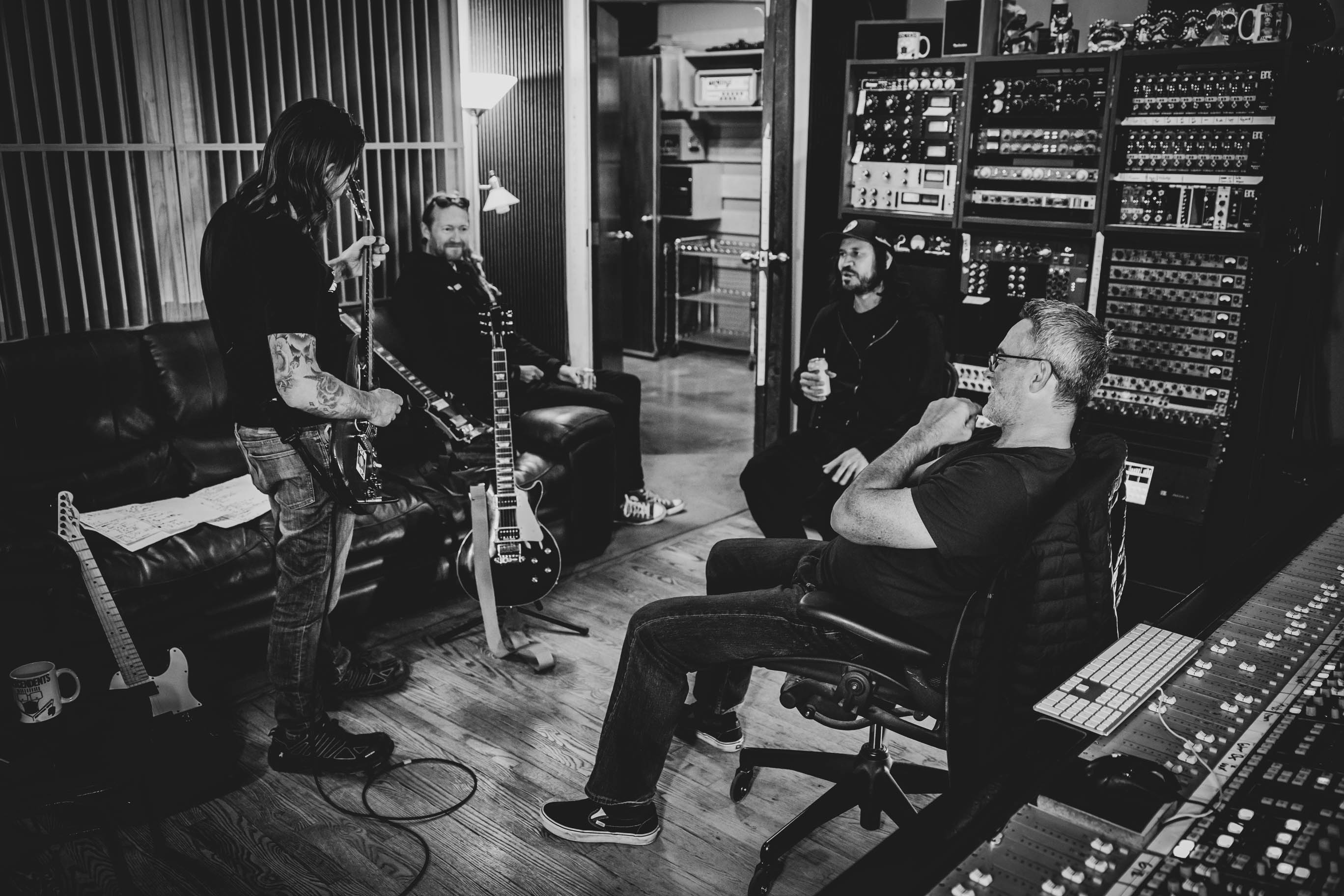
Oh, yeah, absolutely. I've got a little bit of a template, but my template changes. I'll work on a few projects and the next month I'm trying something different. It's always a similar way, but it's evolving.
Same here. I'll have plug-ins in the template as an option, like an EQ that's not even on yet.
Yeah, all inactive, and then you pop in and see which one works best today.
When did you guys make the transition to digital from tape?
The 2-inch Otari MTR-90 was a workhorse. Our machine sounds okay. Nothing special, but it didn't sound bad. Occasionally I'll get nostalgic; "Oh, remember when we could pull up files and they'd just mix themselves? Oh, it was the tape. Let's use the tape again!" Then it's like, "No, there's this weird hum, and the top-end is fucked up."
I don't think people understand how terrifying using tape was.
We had one problem in our early years here where we hit play on the remote: It shocked it and threw four of the channels into record and deleted a bunch of tracks until we jumped over the freaking thing and physically stopped the tape machine. That's the only problem we ever had here. I made a record at Matt Talbott's studio [Earth Analog] with J. Robbins [Tape Op #13]. We did a Shiner record [The Egg]. It was late one night, and we were making rough mixes. I looked over, and the machine was making these noises. "What the fuck?" The tape busted because we were using GP9 on an old Sony machine that didn't want to have tape that was that thick. We had to take the tape back to another studio, tape it together, copy it onto a safety, and take the chorus and put it back into the main one to repair it all. Then we had to re-sing the second chorus because it was gone, but musically it was the same. That's probably the only time I've ever had a really bad problem.
People come into my studio now, and are like, "Oh, I hear tape's really cool."
Yeah, when that was all we had! [laughter] Obviously some people can still get away with doing it all to tape, but very few now.
Do you guys get any requests for that now?
We got a request a handful of years ago. One of our younger guys was doing the session, and he was getting the sounds. The band's going, "Oh, listen to how warm this is! This sounds so good. I'm so glad we're going to tape." I looked over at the machine, and it was on input; not even playing off tape. I didn't tell them. I was going to let them have their fun!
A lot of the records you guys have worked on, the recording involves a certain musical precision.
Yeah. To do a record on tape how we do now would be virtually impossible. We never were really into tape editing when we recorded bands. We would hammer the drummer for the whole recording or play it ourselves and teach them how to play to get a drum track in time. I remember the first time I'd even seen tape editing, we were mixing a record for a bigger band. They had done their last record on Pro Tools, and they didn't like the way it sounded. They had a guy do their record on two 24-track decks. We're sitting there mixing it, and I kept hearing these [zipping sounds]. I'm like, "What the fuck is that?" I look over at the second machine and there are all these splices – like 100 splices per song – where the guy had to edit the drums, Metallica-style. That would have taken two days per song to edit the drums.
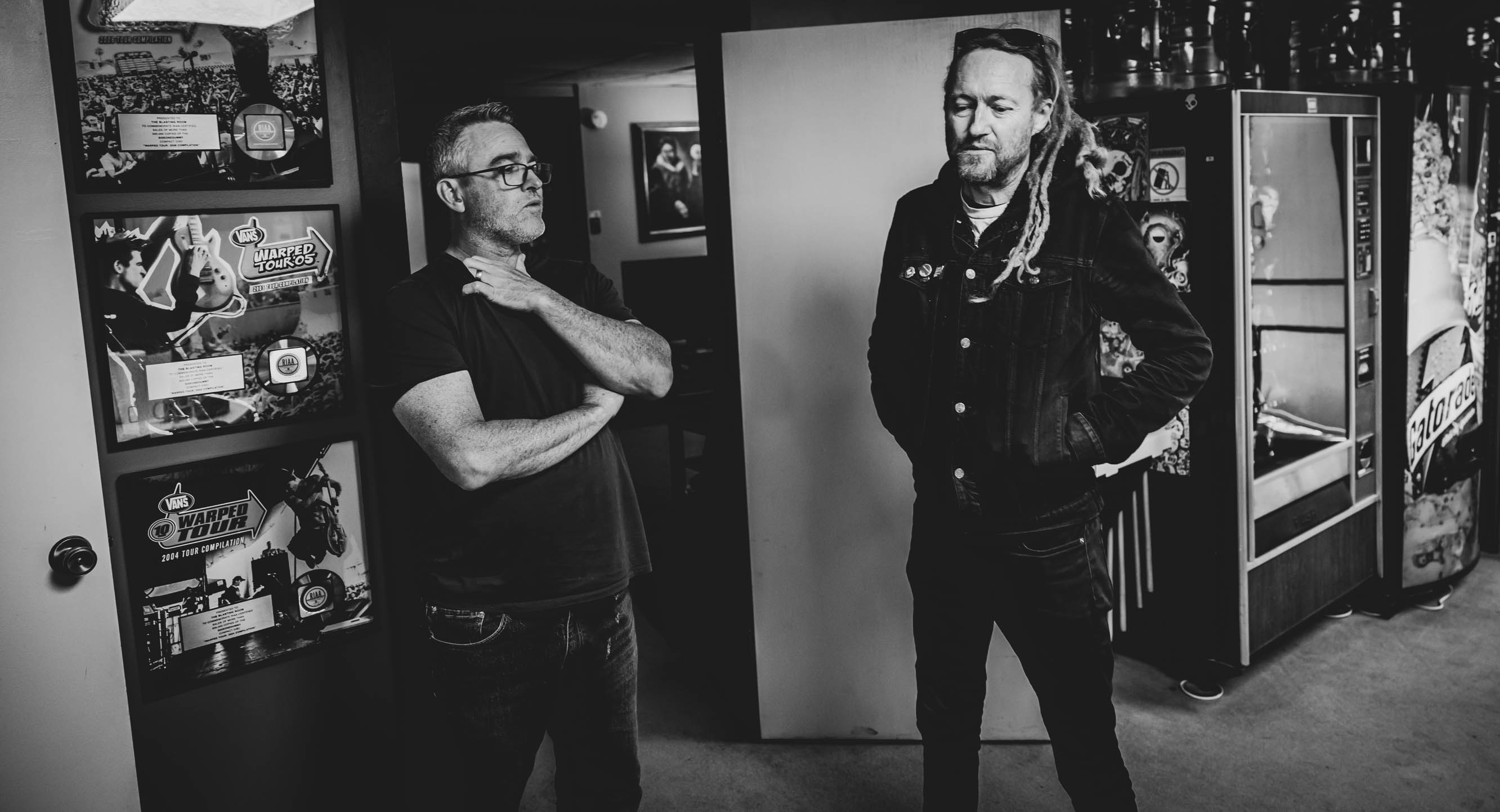
It probably did.
People don't have that much money or time anymore. The majority of players aren't that good. They need a little help.
With you and Bill being drummers and producing all these records, I know you have a ton of drum sets and snares to pick from.
Oh, yeah. We probably have seven or eight drum sets and 30 snares. We have a lot of drums. We have a ton of gear that we've collected forever.
Do bands come out and just use the gear that's there?
They almost always use all of our gear, with the exception that they might bring their own guitars. We have a ton of guitars and basses. Some people are picky, and they want all their own gear. And more power to them!
It's amazing to see the evolution of The Blasting Room. It's a unique path.
It is. There are not too many studios quite like ours. Bill, being in Black Flag and Descendents, he's one of the OGs of punk rock. It's 30 years that we've been here. There's a group of guys who are making a movie about our studio right now [The Blasting Room: A Documentary Film]. That's hopefully going to come out this year. That'll be cool.
We start these studios, and then 25-plus years later we're still doing it.
I know. I always am like, "Fuck, when is this going to stop? Is this ever going to stop? Am I going to get fired?" [laughter]
They're going to find out you're a fraud!
I know! Hey, I've had that dream. Come on!
We all have.
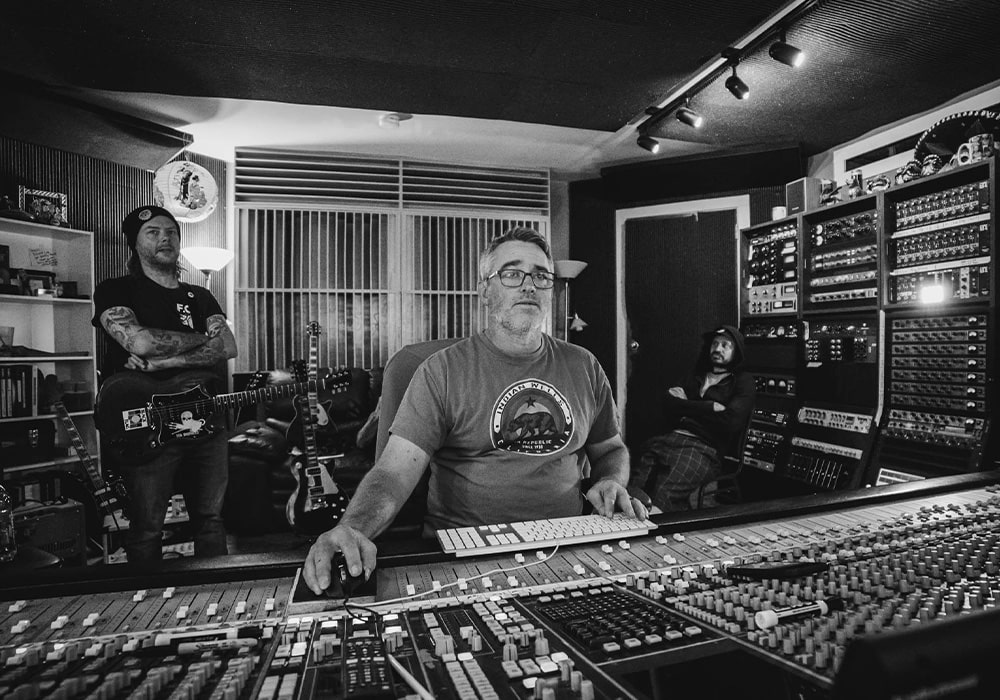
Yeah. I know what I'm doing now, but I didn't know what I was doing for a long time. I just worked 80 hours a week. I don't record very much at all now, so when I go into the room I have to get one of the guys to help. Now that I'm 51, I have reading glasses. When I go to the patchbay I can't see. It's way more of a pain in the ass when I'm tracking to deal with the little stuff. I've got to get a kid in there with me and say, "Here's my input list. Set it up."
Same here. I'll go out and move the mics afterwards.
I'll even have them get the sounds and then I'll change them. When I was doing it constantly it was an extension of my body. I was a lightning bolt around the room. It's crazy when we work in there all the time how fast we get at it.
It's invaluable. I don't know of any other way to inundate yourself and get to where it's just intuitive.
Yeah. I had some good experiences working with different professionals who I learned a lot from. When we started, there was only Mix Magazine. I didn't go to recording school; I just sat in here and recorded. I didn't know what the hell I was doing. I'd look at Mix and see, "Oh, that guy tuned a vocal by putting it through an Eventide," and I'd start trying that. Now there's everything. Tape Op was the first for helping learn how other people do this. Then Gearspace, Mix with the Masters, Puremix, and people putting out videos. You can learn whatever you want. We have six engineers here now, with four rooms, and a lot of times we're all just doing our own projects. We bounce ideas off of each other all the time. "Hey, what's wrong with my mix? What are you using?" We're not completely in our little cocoons.
Was it interesting to see the studio start attracting young engineers?
Oh, yeah, totally. Our newest hire, Colton Krohn, specializes in death metal. He's so good at recording guitars. I used to be really meticulous with recording guitars, but this dude is on another level. He got all of our speaker cabinets, re-amped a guitar riff through every speaker of every cabinet, and then he put them in a session with notes. "On this cabinet, this speaker's the best one, and it pairs best with this head. The Marshalls go better with this one." I shit you not, like a little freaking science experiment. So, on all our cabinets we have these sheets, and you can dry erase on there; "Okay, speaker one is the good one, and it pairs well with this amp." I'm like, "Holy fuck, you guys!" I usually just grab a Marshall cab and call it good! There's stuff that I don't know, still? Holy moly.
I always think there are the parts of the process that we have to blindly trust, to a degree.
Yeah, because you don't want to spend your whole life studying speaker cables and wiring. I spent a good while trying out different cabling for my mastering rig. Now I'm not thinking about it anymore. I'm going to work!
The worst version of ourselves would be the person who can't get anything done because they're trying every option.
Totally. Always have a good standby and throw in a couple of X factors to spice it up or learn something.
I feel like I've gravitated into mixing from being worn out from 20 years of tracking sessions.
That's what you do when you get old; you turn into a mastering engineer! [laughter] I like this because I don't get as attached. It's not wrecking my life. I'm not going home at night, staying up, and going, "Oh, god, that mix; I should try and work on that," and get so immersed in something where it's my whole life. It's nice to do something new every day. I don't get as attached, so I can also have more objectivity. I still get to mix a lot, too. I find myself going down a rabbit hole more there.
Have you ever had a mix that you've had to pass on once you started doing it? I've had a few where I couldn't even fathom how it had been rough mixed.
I've been fired a few times, and then somebody in the band mixes it. I've heard a handful of those, and it's like, "Oh, you wanted it to sound like that? Why the fuck did you call me?" But, generally, I can get into somebody's headspace and get it in the ballpark pretty well. I definitely have been fired a few times. I'll try, then after a bit they're like, "Eh, we're going to send it to the guy who did our last record." That's fine. As long as they pay me for my work, I don't mind. The other day someone was asking, "Do you have a five-year plan at your business? Do you have goals?" I was like, "My goal is just to wake up and do what I want!"





